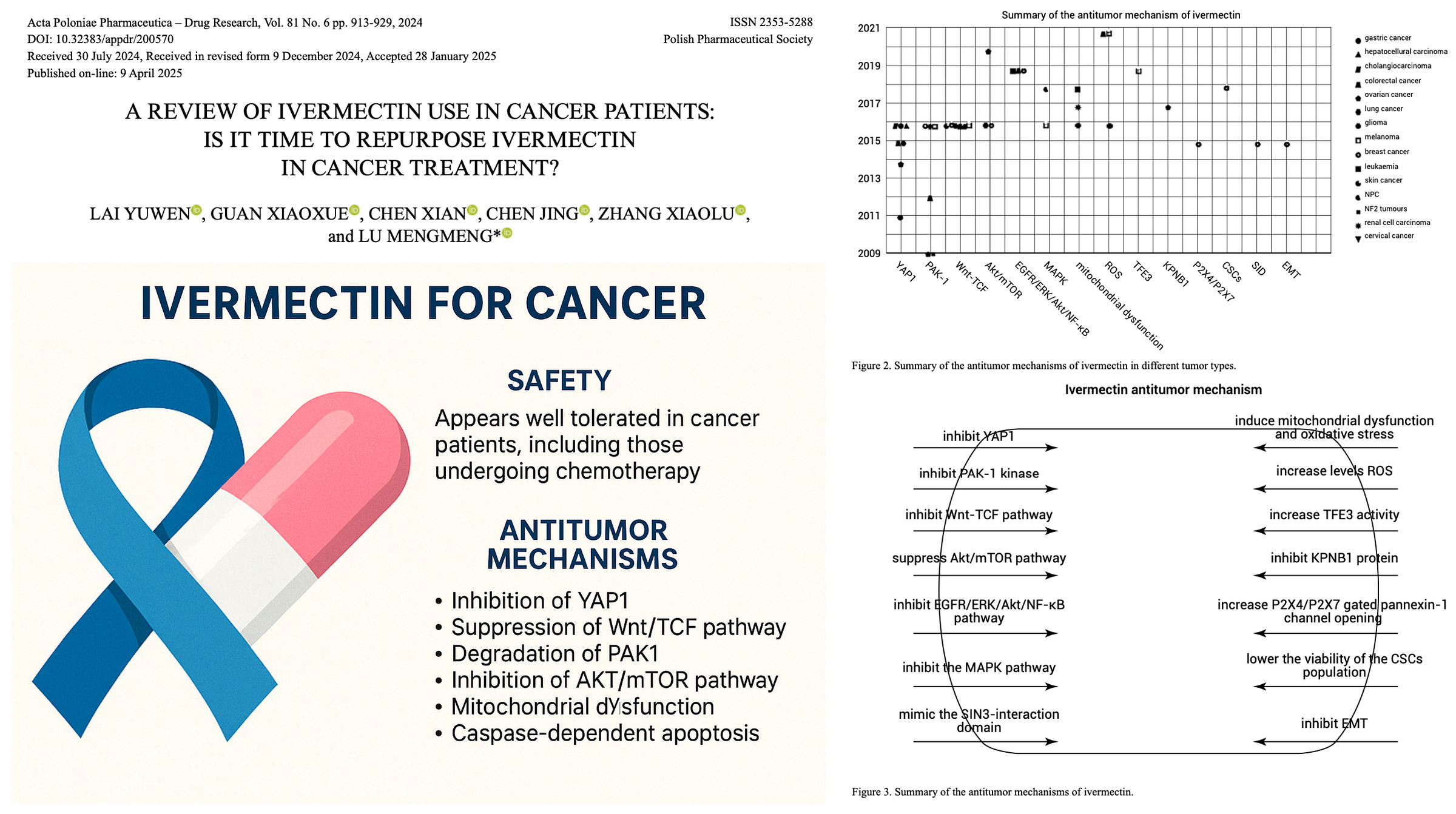NEW STUDY – Ivermectin Shows Striking Anticancer Potential and Remarkable Safety
Largest review to date of ivermectin use in cancer patients finds no safety concerns, promising anecdotal reports, and strong preclinical evidence of tumor suppression.
The study titled “A Review of Ivermectin Use in Cancer Patients: Is it Time to Repurpose the Ivermectin in Cancer Treatment?” was just published in the journal Acta Poloniae Pharmaceutica – Drug Research:
Study Objective and Scope
This systematic review aimed to evaluate the potential for repurposing ivermectin as an anticancer agent, through a dual focus on:
The clinical safety of ivermectin in cancer patients, based on case reports and series involving its use for parasitic infections
The preclinical antitumor activity of ivermectin, drawn from laboratory and animal studies
A total of 2,273 publications were identified, of which 26 studies met inclusion criteria. These studies involved 36 cancer patients who had received oral ivermectin, primarily for parasitic infections.
While none of the patient cases were designed to evaluate antitumor effects, the review also summarizes a growing body of preclinical evidence supporting ivermectin’s potential anticancer mechanisms.
Safety in Cancer Patients
Among the 36 cancer patients, ivermectin was consistently reported as well tolerated.
No serious adverse events were attributed to ivermectin in any of the cancer patients.
Minor side effects, when present, were non-specific and self-limiting (e.g., mild gastrointestinal upset, transient rash).
Ivermectin was safely administered to patients with:
Active chemotherapy
Hematological malignancies (e.g., leukemia, lymphoma)
Solid tumors (e.g., breast, cervical, renal cell carcinoma)
Cancer-Related Clinical Observations
While the review did not identify any formal studies using ivermectin specifically as a cancer therapy in clinical settings, a few case reports noted cancer-related improvements:
Pediatric ALL (Acute Lymphoblastic Leukemia)
A 6-year-old male with ALL remained well and in long-term remission after ivermectin treatment for Demodex folliculorum infestation.
No relapse or progression noted at follow-up.
Acute Myeloid Leukemia (AML)
A patient undergoing chemotherapy developed disseminated scabies.
After oral ivermectin treatment (0.2 mg/kg, repeated after two weeks), all remaining papules disappeared with no signs of recurrence.
The patient remained clinically stable, although remission status was not explicitly claimed.
Hematologic Malignancies (Leukemia, Lymphoma)
Several patients receiving hematopoietic stem cell transplants or undergoing treatment for leukemia were treated with ivermectin for Demodex or other parasitic infections.
In these cases, skin symptoms resolved rapidly, and patients remained stable over the short-to-intermediate term, though direct anticancer effects were not confirmed.
Adult T-cell Leukemia/Lymphoma (ATL)
A patient with ATL and HTLV-1 infection was successfully stabilized and discharged after a combination of ivermectin and chemotherapy.
The authors note that ivermectin may have contributed to disease control, but no firm conclusions can be drawn.
Antitumor Mechanisms (Preclinical Evidence)
Preclinical studies in cell lines and animal models have demonstrated that ivermectin exerts anticancer effects through multiple, tumor-suppressive mechanisms, including:
Inhibition of YAP1 (Yes-associated protein 1) nuclear translocation
Suppression of the Wnt/TCF (T-cell factor) signaling pathway
Degradation of p21-activated kinase 1 (PAK1)
Inhibition of the AKT/mTOR signaling cascade
Induction of mitochondrial dysfunction and oxidative stress
Activation of caspase-dependent apoptosis
These mechanisms have been observed across several cancer types, notably:
Glioblastoma
Ovarian cancer
Chronic myeloid leukemia (CML)
Cervical cancer
Based on the most comprehensive systematic review of ivermectin use in cancer patients to date, ivermectin appears to be safe—even in individuals undergoing active chemotherapy. Its broad range of anticancer mechanisms demonstrated in preclinical models, combined with anecdotal reports of cancer-related improvements, support its candidacy for repurposing as an oncologic therapy. Well-designed, large-scale clinical trials should be launched as soon as possible to properly assess ivermectin’s potential against cancer.
Epidemiologist and Foundation Administrator, McCullough Foundation
www.mcculloughfnd.org
Please consider following both the McCullough Foundation and my personal account on X (formerly Twitter) for further content.






We must exit these corrupted systems of science and medicine and build our own that are decentralized, transparent, harder to corrupt, and that use collective intelligence software to help us solve problems in large groups.
Yes; and Dr. Makis proves this, daily.